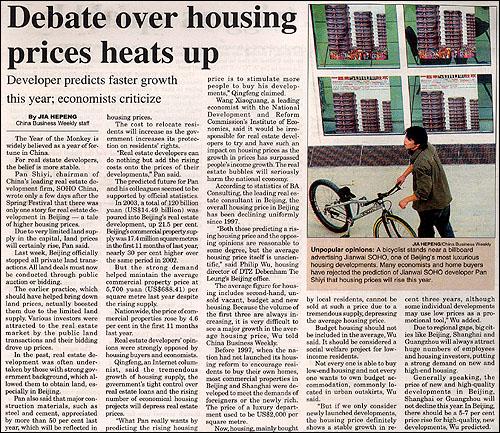
The Year of Monkey is widely believed as a year of fortune in China.
For real estate developers, the belief is more stable.
Pan Shiyi, chairman of China's leading real estate development firm, SOHO China, wrote only a few days after the Spring Festival, Chinese new year, that there was only one story for real estate development in Beijing -- a tale of higher housing prices.
Due to very limited land supply in the capital, land prices will certainly rise, Pan said.
Last week, Beijing officially stopped all private land transactions. All land deals must now be conduced through public auction or bidding.
The earlier practice, which should have helped bring down land prices, actually boosted them due to the limited land supply. Various investors were attracted to the real estate market by the public land transactions and their bidding drove up prices.
In the past, real estate development was often undertaken by those with strong government background, which allowed them to obtain land, especially in Beijing.
Pan also said that major construction materials, such as steel and cement, appreciated by more than 50 per cent last year, which will be reflected in housing prices.
The cost to relocate residents will increase as the government increases its protection on residents' rights. "Real estate developers can do nothing but add the rising costs onto the prices of their developedments," Pan said.
The predicted future for Pan and his colleagues seemed to be supported by official statistics.
In 2003, a total of 120 billion yuan (US$14.49) was poured into Beijing's real estate development, up 21.5 per cent. Beijing's commercial property supply was 17.4 million square metres in the first 11 months of last year, nearly 30 per cent higher over the same period in 2002.
But the strong demand helped maintain the average commercial property price at 5,700 yuan (US$688.41) per square metre last year despite the rising supply.
Nationwide, the price of commercial properties rose by 4.6 per cent in the first 11 months last year.
Real estate developers' opinions were strongly opposed by housing buyers and economists.
"What Mr. Pan really wants by predicting the rising housing price is to stimulate more people to buy his developments," Qingfeng claimed.
Wang Xiaoguang, a leading economist with the National Development and Reform Commission's Institute of Economics, said it would be irresponsible for real estate developers to try and have such an impact on housing prices as the growth in prices has surpassed people's income growth. The real estate bubbles will seriously harm the national economy.
According to statistics of BA Consulting, the leading real estate consultant in Beijing, the overall housing price in Beijing has been declining uniformly since 1997.
"Both those predicting a rising housing price and the opposing opinions are reasonable to some degree, but the average housing price itself is unscientific," said Philip Wu, housing director of DTZ Debenham Tie Leung's Beijing office.
The average figure for housing includes second-hand, unsold vacant, budget and new housing. Because the volume of the first three are always increasing, it is very difficult to see a major growth in the average housing price, Wu told China Business Weekly.
Before 1997, when the nation had not launched its housing reform to encourage residents to buy their own homes, most commercial properties in Beijing and Shanghai were developed to meet the demands of foreigners or the newly rich. The price of a luxury department used to be US$2,000 per square metre.
Now, housing, mainly bought by local residents, cannot be sold at such a price due to a tremendous supply, depressing the average housing price.
Budget housing should not be included in the average, WU said. It should be considered a social welfare project for low-income residents.
Not every one is able to buy low-end housing and not every one wants to own budget accommodation, commonly located in urban outskirts, Wu said.
"But if we only consider newly launched developments, the housing price definitely shows a stable growth in recent three years, although some individual developments may use low prices as a promotional tool," Wu added.
Due to regional gaps, big coastal cities like Beijing, Shanghai and Guangzhou will always attract huge numbers of employees and housing investors, putting a strong demand on new and high-end housing.
Generally speaking, the price of new and high-quality developments in Beijing, Shanghai or Guangzhou will not decline this year. In Beijing, there should be a 5-7 per cent price rise for high-quality, new developments, Wu predicted.





